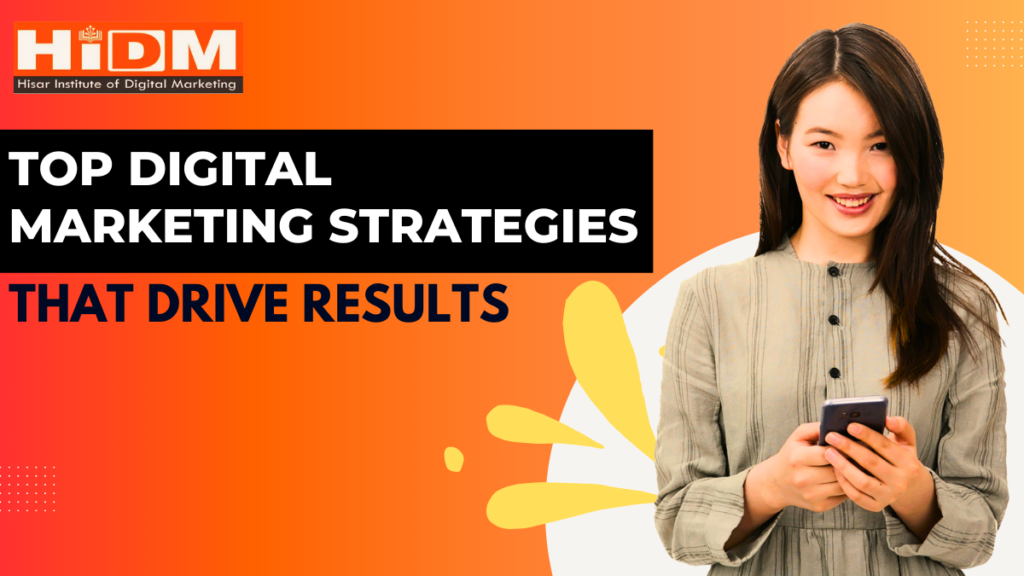Introduction
Digital marketing has revolutionized the way businesses promote their products and services. With the ever-increasing competition in the online space, it is crucial to adopt effective strategies that can drive results and help you stand out from the crowd. In this article, we will explore the top digital marketing strategies that have proven to be successful in attracting and engaging audiences, increasing brand visibility, and driving conversions.
1. Search Engine Optimization (SEO)
SEO is a cornerstone of any successful digital marketing strategy. By optimizing your website and content for search engines, you can improve your organic visibility and drive targeted traffic. Focus on keyword research, on-page optimization, technical SEO, and building high-quality backlinks. Regularly analyze your rankings and make necessary adjustments to stay ahead in search engine results pages (SERPs).
2. Content Marketing
Content marketing involves creating and sharing valuable and relevant content to attract and retain your target audience. Develop a content strategy that aligns with your business goals and audience preferences. Create high-quality blog posts, articles, videos, infographics, and other content formats that provide valuable insights and solve your audience’s problems. Promote your content through various channels, such as social media and email marketing, to maximize its reach and impact.
3. Social Media Marketing
Social media platforms offer a vast opportunity to engage with your target audience, build brand awareness, and drive website traffic. Identify the platforms where your audience is most active and create a consistent presence there. Develop a social media strategy that includes creating compelling content, interacting with followers, running targeted advertising campaigns, and leveraging analytics to measure and optimize your results.
4. Pay-Per-Click Advertising (PPC)
PPC advertising allows you to display targeted ads on search engines and social media platforms and pay only when users click on them. Platforms like Google Ads and Facebook Ads offer robust targeting options to reach specific demographics and interests. Conduct thorough keyword research, create compelling ad copy, and optimize your campaigns based on data and analytics. Continuously monitor and refine your PPC efforts to maximize your return on investment (ROI).
5. Email Marketing
Email marketing remains a powerful strategy for nurturing leads, building relationships, and driving conversions. Build an email list by offering valuable content or incentives to your website visitors. Segment your list based on demographics or behaviors and send personalized and targeted emails to different segments. Use email automation tools to streamline your campaigns, track engagement metrics, and optimize your email content and frequency for maximum effectiveness.
6. Influencer Marketing
Influencer marketing leverages the popularity and influence of individuals or personalities to promote your brand or products. Identify influencers in your industry who have a strong following and align with your brand values. Collaborate with them to create authentic content or sponsored posts that can reach their audience and generate brand awareness. Monitor the performance of your influencer campaigns and evaluate their impact on your brand’s visibility and engagement.
7. Video Marketing
Video content has gained tremendous popularity in recent years and has become a powerful tool for digital marketing. Create engaging and informative videos that resonate with your target audience. You can utilize platforms like YouTube, Instagram, and TikTok to share your videos. Incorporate video content into your website, social media campaigns, and email marketing to enhance engagement and conversions.
8. Conversion Rate Optimization (CRO)
CRO focuses on optimizing your website and landing pages to increase the percentage of visitors who take desired actions, such as making a purchase or filling out a form. Conduct A/B testing, optimize your website’s user experience, improve site speed, and implement persuasive call-to-actions (CTAs). Analyze user behavior, gather feedback, and make data-driven changes to improve your conversion rates continually.
9. Chatbots and AI-powered Tools
Leveraging chatbots and AI-powered tools can enhance your customer service and automate certain marketing tasks. Implement chatbots on your website or social media platforms to provide instant support and gather customer data. Use AI-powered tools for data analysis, personalization, and predictive analytics to optimize your marketing efforts and deliver more targeted and relevant messages to your audience.
10. Data Analytics and Measurement
Measuring and analyzing the performance of your digital marketing campaigns is crucial for understanding what works and what doesn’t. Utilize analytics tools like Google Analytics to track website traffic, user behavior, conversions, and other key metrics. Set up goals and conversion tracking, generate reports, and gain valuable insights to make data-driven decisions and continuously improve your strategies.
Conclusion
Implementing effective digital marketing strategies is essential to drive results and achieve your business objectives in the online space. By utilizing a combination of SEO, content marketing, social media marketing, PPC advertising, email marketing, influencer marketing, video marketing, CRO, chatbots, AI-powered tools, and data analytics, you can create a comprehensive and impactful digital marketing strategy that helps you connect with your audience, increase brand visibility, and drive conversions. Stay updated with industry trends, adapt to changes, and continually optimize your strategies to stay ahead in the dynamic digital landscape.

